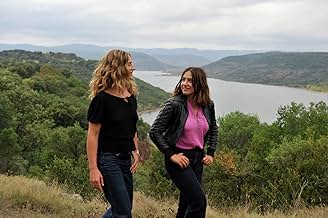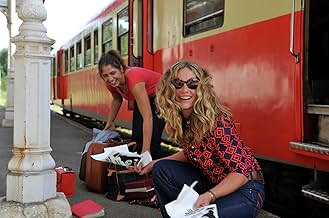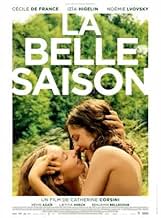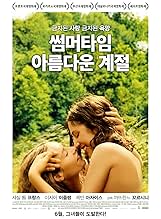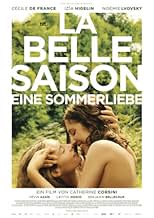PUNTUACIÓN EN IMDb
6,7/10
6,1 mil
TU PUNTUACIÓN
Una joven se traslada de la campiña francesa a París y comienza una apasionada relación amorosa con una líder feminista.Una joven se traslada de la campiña francesa a París y comienza una apasionada relación amorosa con una líder feminista.Una joven se traslada de la campiña francesa a París y comienza una apasionada relación amorosa con una líder feminista.
- Dirección
- Guión
- Reparto principal
- Premios
- 3 premios y 8 nominaciones en total
Cécile de France
- Carole
- (as Cécile De France)
Natalie Beder
- Marie-Laure
- (as Nathalie Beder)
Reseñas destacadas
LGBT rights are more relevant than ever. In several countries, unfortunately, the trend is towards more difficult living conditions for gays and transgender people. Seen in such a perspective, the plot of this film remains relevant, despite the fact that it depicts a summer in 1971.
Although perhaps the problem here is something we have seen in many films, the film is experienced as both engaging and well told.
I sat thinking when I saw this movie; how many such fates exist? Both before and now? That people cannot live their lives to the fullest, in fear of condemnation from their surroundings. There are probably a lot of them, and in that way such films become important and unfortunately relevant. For such films we need. We need to be reminded of how the world treats and views queer people. In addition to a strong and pointed action, the film is also beautifully filmed, well directed and with good actors who get both convincing and engaging.
It's 1971 France. Delphine Benchiessa (Izïa Higelin) works at her family's rural farm. Her father berates her for being too slow to find a man. Unbeknownst to him, she's a lesbian. Her girlfriend surprises her by marrying a local boy. In Paris, she gets caught up with a group of militant feminists. She falls for their leader Carole (Cécile de France). After her father suffers a stroke, Delphine is forced to go home and take care of the farm.
It's another version of the tragic lesbian love story. I do wonder if 1971 France is a little too late to have this story. Usually, it's Victorian ladies on a gravel beach trying to discover lesbianism. In reality, rural conservatism and family dynamics do account for it. These ladies are not ignorant of the world. The 70's is not all disco and gay. It's still a fight for rights and acceptance. The danger isn't as high, and the story becomes smaller. Delphine could always run off and abandon the farm. It's not like society prevents her from getting a job in Paris. The issue becomes more internal and personal. It's a relationship movie.
It's another version of the tragic lesbian love story. I do wonder if 1971 France is a little too late to have this story. Usually, it's Victorian ladies on a gravel beach trying to discover lesbianism. In reality, rural conservatism and family dynamics do account for it. These ladies are not ignorant of the world. The 70's is not all disco and gay. It's still a fight for rights and acceptance. The danger isn't as high, and the story becomes smaller. Delphine could always run off and abandon the farm. It's not like society prevents her from getting a job in Paris. The issue becomes more internal and personal. It's a relationship movie.
This story of a relationship between a farmer's daughter and the woman she meets in Paris is effective in some ways. Set in the early 70s in the first flush of modern feminism, the plot is pretty simple and the issue simpler - will they stay together against the pressures of rural society? Izia Hegelin makes an effective and believable daughter of the soil, struggling to reconcile her feelings and her ties to her land and family; in an underwritten role as her lover, Cecile de France is less effective but does her best. Some good scenes showing the sometimes silly behaviour of activists and their disconnect from real life. The ending seemed slightly unlikely to me in some ways. There are sex scenes but they are neither very erotic nor graphic. So - worth seeing, but only a moderately good film.
I didn't much care for the first half of 'Summertime': a posse of beautiful, self-confident and middle-class young feminists assert their right to "to as they please" in the Paris of the 1970s. What is absent from the portrayal is any sense of the personal insecurity that cripples most of us; these sisters, it seems, can quite literally do anything for themselves. The film becomes more nuanced when it follows two of its protagonists (a lesbian couple) back to the farm in the country where one of them (Delphine) grew up, and whence she has now been summoned owing to the illness of her father. There's still some idealisation here: the family own their farm and live a simple peasant life. But the conflict between Delphine's familial and spatial sense of identity, and the new relationship she has forged in the city, is nicely portrayed, as is the guarded hostility of her mother and her local acquaintances to the choices she has made in her new life. Overall, it's not nearly as strong as 'Blue is the Warmest Colour', but it grew on me as I watched it.
When you watch this feature, you think of LA VIE D'ADELE, speaking of the same scheme, female homosexuality. This film is gripping at the most, telling us the story of two Young women who met in Paris during the early seventies, when the feminist movements spread all over the world. And don't forget that two years ago, in France, the marriage for everyone laws were on every lip. So it remains in the line of actuality. Cecile de France is terrific here, so is Noémie Chowsky, as the mother of one of the two women in love for each other. A human drama that grabs you from the start to the end. I highly recommend it. Catherine Corsini made here an outstanding piece of work.
¿Sabías que...?
- CuriosidadesDirector Catherine Corsini stated that she named the two main characters Carole and Delphine after real life artists and feminists Carole Roussopoulos and Delphine Seyrig.
- PifiasAfter a swim in the pond, the girls lay out to take some sun. As Carole lays naked on the blanket resting her head on Delphine, her arms are raised and we can see she does not have any underarm hair. As the girls start to kiss and caress Carole's armpit is exposed again but this time full of underarm hair.
- ConexionesReferenced in Théo & Hugo: París 5:59 (2016)
- Banda sonoraL'Hymne du MLF, d'apres Le Chant des Marais
(Johann Esser/Wolfgang Langhoff/Rudi Goguel)
With the kind permission of Edition Peters Group
All rights reserved
Selecciones populares
Inicia sesión para calificar y añadir a tu lista para recibir recomendaciones personalizadas
- How long is Summertime?Con tecnología de Alexa
Detalles
- Fecha de lanzamiento
- Países de origen
- Sitio oficial
- Idiomas
- Títulos en diferentes países
- Un amor de verano (La belle saison)
- Localizaciones del rodaje
- Haute-Vienne, Francia(scenes in the country)
- Empresas productoras
- Ver más compañías en los créditos en IMDbPro
Taquilla
- Presupuesto
- 4.800.000 € (estimación)
- Recaudación en Estados Unidos y Canadá
- 35.322 US$
- Fin de semana de estreno en EE. UU. y Canadá
- 15.413 US$
- 24 jul 2016
- Recaudación en todo el mundo
- 3.778.938 US$
Contribuir a esta página
Sugerir un cambio o añadir el contenido que falta

![Ver Bande-annonce [OV]](https://m.media-amazon.com/images/M/MV5BMzZiZTVkNWItZGNjYS00ZDY2LWFkOGItZjhkNTk2NDQ3ZDE2XkEyXkFqcGdeQXRyYW5zY29kZS13b3JrZmxvdw@@._V1_QL75_UX500_CR0)


